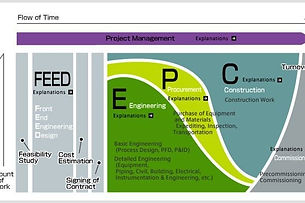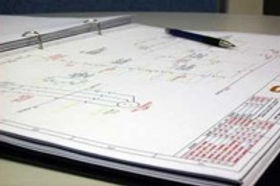Our Services
In order to achieve our objective of total customer satisfaction, we develop flexible interactive working relationships with our customers to ensure that we focus on the changing needs and expectations of the project. We take a innovative engineering approach with an emphasis on value to ensure all relevant new proven technological developments and market trends are fully understood and exploited by our engineering team, and whose skills and experience are constantly upgraded.

To meet our market sector criteria and specific industry demands and as professional engineering design house, all projects are managed in accordance to strict quality standards. The following core activities are the basis of our projects execution:
Feasibility Studies
PACE has the required HR pool to conduct feasibility studies in its areas of expertise. We can analysis and evaluate a proposed project to determine if it;
1. is techincally feasible,
2. is feasible within the estimated cost.
3. will be profitable.
Our assessments are based on an outline design of system requirements, to determine whether the engaged parties have the technical expertise to handle completion of the project. Our reports always take in to consideration;
-
A brief description of the business to assess more possible factors which could affect the study
-
The part of the business being examined
-
The human and economic factor
-
The possible solutions to the problem
All areas of TELOS are considered in our reports, i.e. Technical, Economic, Legal, Operational, and Scheduling.
Site Surveys
A site survey is an inspection of an area where work is proposed, to gather information for a design or an estimate to complete the initial tasks required for an outdoor activity. PACE can determine a precise location, access, best orientation for the site and the location of obstacles before the client or end-user starts its FEED. The type of site survey and the best practices required depend on the nature of the project. Major site surveys conducted by PACE include urban construction, specialized construction (such as the location for a telescope) and wireless network design.
_edited.jpg)
Front End Engineering Design (FEED)
Conceptual engineering, consultancy and FEED work is one of our core expertise and activities where we provide our clients with developing and defining their telecommunication requirements and establishing the criteria of achieving these requirements.

Detailed Engineering Design
As a turnkey telecommunication system integrator, the detailed engineering design work is the core function of our work and deliverables to the client. Our projects are engineered to provide every specific details related to the project in terms of drawings, design reports and design calculations. Each project is assigned a highly skilled engineering design team comprising of experienced telecommunication professionals. To support the design teams, a dedicated CAD/CAM design center is equipped with CAD/CAM software and workstations to produce the design drawings in accordance to the client standards.

Project Management
Project management is a key activity to achieve a successful project. PACE boasts a certified, dedicated, highly experienced and motivated project management team for this process. Each project is assigned to a project manager who handles both internal and external project scheduling, budgeting, and coordination using a wide range of software applications.
Our successful projects are dependent on the implementation of knowledge and experience available to us through our seasoned PMT. All stages/phases of the projects as described below are monitored closely and periodic reports are sent to the executive management for keeping them involved and to avail their valuable input where required.
-
Project conception and initiation
At this stage, our project management team collaborates with the client for collecting all required information which may be used for planning and executing the project. A high level design is also made to identify when the project can realistically be completed.
-
Project definition and planning
Here, we thoroughly plan our projects. Put everything in writing while outlining the work to be performed. During this phase, our teams prioritize the project, calculate a budget and schedule, and determine what resources are needed.
-
Project launch or execution
Resources' tasks are distributed and teams are informed of responsibilities. Structured communication is one of our key attributes during this phase which not only helps in successful delivery of the project but also makes the next phase easy for the PMT.
-
Project performance and control
Our Project managers then compare project status and progress to the actual plan, as resources perform the scheduled work. During this phase, project managers adjust schedules or do what is necessary to keep the project on track.
-
Project close
After project tasks are completed and the client has approved the outcome, an evaluation is necessary to highlight project success and/or learn from project history. This also includes our SAT signing, hand-over and initiation of subsequent warranty periods or SLAs if included in the contract.



Procurement
Procurement of equipment and hardware is sourced worldwide via our dedicated procurement department. The basis of the procurement is the compliance to meet the customers’ operational specifications and final engineering design.
We follow our procurement plans & cycle without any loop hole and this is guaranteed by internal controls, checks and monitoring of the process/status throughout a project. Our procurement process goes through a set of checks and balances which results in minimizing risks and successful project delivery. A brief summary of our procurement processes is as follows.
-
Defining the project need/requirement.
Our procurement department defines the requirements and finalize a scope of procurement for seamless procurement activities throughout the process. They evaluate the options available at hand keeping in mind the requirements and solutions.
-
Developing the Procurement Strategy.
Depending on the scale of the project, there could be a very wide range of potential solutions and approaches to the procurement need and a number of ways of researching the market and selecting a supplier. At this stage, we determine whether we have to outsource or produce the required deliverable in-house.
-
Supplier Selection and Evaluation.
After researching the market and establishing our procurement approach, we evaluate the solutions available. This often involves a formal tender process or an on-line auction. Our criteria for comparing different solutions and suppliers is always critical. We Weigh the key criteria heavily and don’t attach too much importance to aspects that will have little impact on the solution.
-
Negotiation and award.
After selection of the supplier comes a vigorous negotiation cycle. This is not just about price. We think in terms of Total Cost of Ownership. A cheap product is not so cheap if the carriage costs are huge or if the maintenance contract is onerous.
We consider carefully the process by which the goods or services will be ordered and approved; how they will be delivered and returned if necessary; how the invoice process will work and on what terms payment will be made. Considering the whole procurement process at the outset reduces our costs and risk significantly.
-
Induction and Integration.
No goods or services are ordered or delivered until the contract is signed, but this is not the end. It is vital that the delivery process is integrated with the engineering & installation processes. Any service levels that have been agreed need to be measured and KPIs put in place. Regular reviews are also established to minimize the chances of foul play from either side.


System Integration
PACE is developing a dedicated custom integration center equipped with the necessary tools and equipment to assemble, interconnect and integrate the systems based on the approved engineering design drawings by our client. In addition, plans for our integration center include fully equipped Integration facility to stage full scale factory acceptance tests (FATs) and system Integration Tests (SIT) witnessed by our client prior to the shipment of the equipment to project site.
Staging & Installation
As part of our turnkey responsibilities, PACE is developing a dedicated technical department, which will handle the on-site installation and commissioning activities, including system training where & when required. Our technical team is constantly growing and consists of highly skilled, motivated and well accustomed to the nature and the environment of the Oil & Gas Industry. We can deploy our team globally to provide the vital support necessary for our clients’ operations and installations.

Testing, Commissioning & Site Acceptance Test (SAT)
In our commitment to ensuring the seamless operation of our solutions, PACE is dedicated to comprehensive testing, commissioning, and Site Acceptance Test (SAT) procedures. Our experienced team meticulously conducts thorough testing protocols to verify the functionality, performance, and reliability of the installed systems. During the commissioning phase, we ensure that all components are properly configured, integrated, and optimized to meet the project requirements. Additionally, our SAT process involves rigorous on-site testing to validate that the systems meet the client's specifications and performance criteria in the actual operating environment. With our steadfast dedication to quality assurance, PACE ensures that our solutions are fully operational and exceed client expectations before final acceptance at the project site..
Post Sales Support
PACE believes in life long relationships. That is why we offer our clients various after-sales support options which make the end-user tension free. The post-sales support provisions can include training on the use of the product, updates for software, scheduled maintenance or provisions of materials or parts, repair and servicing, money-back guarantees, or warranties for replacement in case of damage or defects.
The various types of after-sales support may consist of the following, depending on the type of contract agreed between PACE & its client.
Technical Support/Help desk: Assistance with technology merchandise, system components & most electrical or mechanical products
Customer Support: Includes services that help the customer with the product
Automated Customer Service: Provides assistance 24 hours a day and is available online
Support Automation: Includes online knowledge bases like forums in which to ask questions, proactive support such as 24/7 monitoring for alarm systems, and preventative support that generates solutions through questions, logbook files or configuration changes.
A detailed document entailing our project execution methodology will be provided to the client upon request.

Contact Us
Address
PO Box - 72387
Al-Khobar-31952, KSA
Contact
+966 13 8970900
+966 13 8992517
+966 548 050 844
Opening Hours
Sun - Thu
8:00 am – 6:00 pm
Friday - Saturday
Closed
